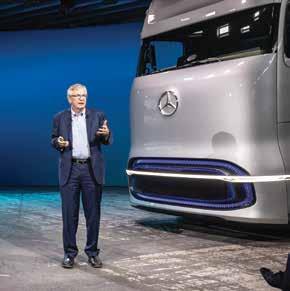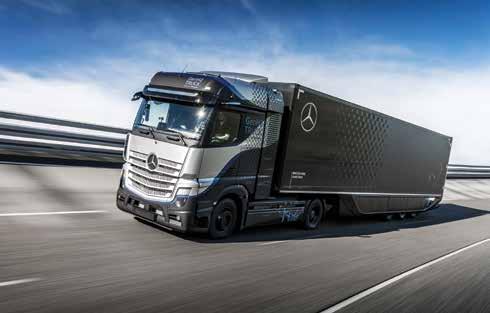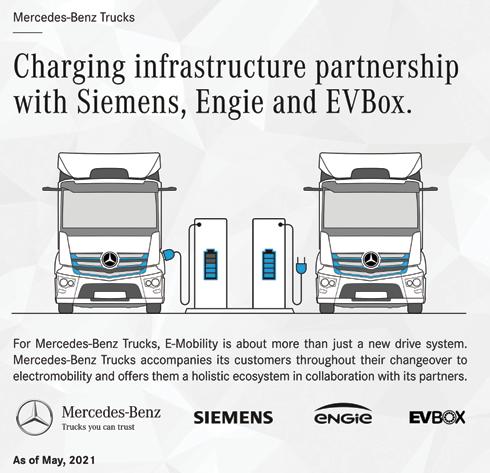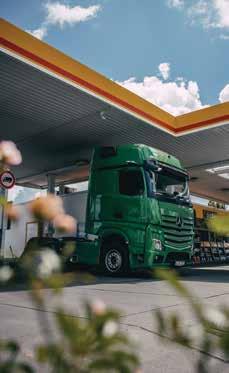
6 minute read
DIALOGUE
Daimler AG restructures Truck divisions and sets out ambitions as an independent company

Daimler Truck recently hosted its inaugural Strategy Day, outlining its ambitions as an independent company and its plans to unlock its full potential, both operationally and financially. Daimler Truck’s management board led by CEO Martin Daum presented strategic objectives, key financial targets and technological goals.
Daimler Truck starts this journey from a leading position, as the number one in the global commercial vehicle business, in terms of sales, market share and global reach. Daimler Truck generates over €40bn of revenue and sells over half a million trucks and buses in a typical year. With strong brands across all major continents like Freightliner, MercedesBenz, FUSO and BharatBenz, Daimler Truck offers the industry’s widest range of trucks and buses. The Daimler AG company is also a technology pioneer in terms of safety, efficiency and electrified powertrains.
While Daimler Truck is dominant in North America, commanding a 40 percent market share in the heavy-duty segment with high profitability, its recent record in other market regions is less satisfactory. The inconsistent regional profitability records of Europe, Brazil and Asia need to be improved significantly, according to Martin Daum - “Our mission as an independent company is clear: Our ambition is to lead the way to zero emissions in the trucking business by accelerating the development of battery and fuel cell vehicles. And we will reset profitability. We will target the benchmark in each region. Every region must deliver competitive performance and we are willing to implement the measures necessary to achieve this goal. We are willing to take hard decisions to lower our breakeven and raise our performance.”
In presenting the company’s financial ambitions, Daimler Truck CFO Jochen Goetz made commitments to improving profitability, raising returns and delivering strong shareholder value as an independent company. Daimler Truck is targeting benchmark profitability in all regions, and aims for an overall double digit return of sales by 2025, subject to strong market conditions.
Mr. Goetz announced that it will reduce fixed costs, capex and R&D spending by 15% by 2025 (vs. 2019 actuals): “Fixed cost reduction will include a personnel cost reduction target for Mercedes-Benz Trucks of €300 million by 2022, and new measures to reduce complexity streamline processes and drive sustained savings. Daimler Truck will also intensify its focus on the most profitable segments and regions. This will include a clearer emphasis on the more profitable heavy duty segment in the main regions, and refocusing investments from ICE powertrains towards zero emission and standardized global EV architectures.”
Daimler Truck will put further emphasis on the growth of its aftermarket and services revenues to drive profitability, and customer retention. This includes the traditional spare parts and maintenance service business, and also financial services like tailor-made leasing, financing and insurances. New and fast growing services in the fields of digitalized, autonomous and electrified transport offer additional growth potential. Overall, Daimler Truck sees significant growth potential in services and aims to increase the revenues on the service portfolio from the current 30% towards 50% in 2030.
“We need to reset profitability. We have set clear targets to streamline our fixed cost base and unlock growth in services. And we will also use our targeted regional approach to foster entrepreneurship and financial performance in our business units,” added Jochen Goetz.
Andreas Gorbach, the new CTO & Head of the Truck Technology Group,


set out Daimler Truck’s technology strategy: First of all, the company will stage down internal combustion engine (ICE) powertrain spending and continue to work with partners. For instance, Daimler Truck is already partnering with Cummins for medium duty engines. In addition the company is actively seeking additional partnerships in the heavy duty engine sector to share necessary investments. Daimler Truck will further reduce spending in conventional powertrain and redirect the vast majority of R&D spending to Zero Emission Vehicle (ZEV) technologies by 2025. For ZEV technology, the company is committed to both battery-electric vehicles (BEV) and hydrogen solutions.
Having started with the fully electric FUSO eCanter back in 2017, Daimler Truck has established the broadest portfolio of ZEV commercial vehicles of all global Truck OEMs. ZEVs such as Freightliner’s eCascadia and eM2, Mercedes-Benz eActros and eCitaro bus and the iconic Thomas Built Buses Jouley are already operating on a daily basis and have driven more than 10 million kilometers in customer hands. Further products such as a 500km range eActros LongHaul will be launched in the coming years. With a dedicated next generation BEV truck planned for the coming years, Daimler Truck is aiming for a range capability of up to 800 km.
In addition, Daimler Truck made some key partnership announcements in the fields of battery technology and charging infrastructure, such as strengthen its existing partnership with lithium-ion battery manufacturer and developer Contemporary Amperex Technology Co. Limited (CATL), based on their shared vision of CO2-neutral electrified truck transport. CATL will be the supplier of lithium-ion battery packs for the Mercedes-Benz eActros LongHaul battery-electric truck, which is planned to be ready for series production in 2024. The supply will extend beyond 2030. The batteries will combine high energy density with ultra-long cycle life as well as fast-charging ability to meet the unique requirements of battery-electric long-haul trucks. In addition, the companies intend to jointly design and develop even more advanced next-generation battery cells and packs for truck specific applications, with a focus to support different truck applications and flexible compatibility with future e-truck models.
In Europe Mercedes-Benz Trucks announced a strategic partnership with Siemens Smart Infrastructure and Engie to provide charging solutions for truck fleets at depots. In North America DTNA’s powertrain unit Detroit announced a partnership with Power Electronics to provide onsite consulting, installation and support for 350 kw megachargers.
In addition to its intense focus on battery electric trucks, Daimler Truck also intends to accelerate the development and deployment of Hydrogen Fuel Cell Trucks (FCEV). The high energy density of hydrogen, quick refueling times and the likely development of a hydrogen energy system in many markets mean that Daimler Truck is convinced that FCEVs will play a key role in commercial transportation. Backed by the cellcentric JV with Volvo AB and with a clear technology roadmap, Daimler Truck is committed to bringing these vehicles to the market.
The key challenge for FCEV technology is infrastructure. But as part of its strategy to kick-start infrastructure for both BEV and FCEV vehicles, Daimler Truck announced a new partnership with Shell. Daimler Truck and Shell have signed an agreement to jointly drive hydrogen-based fuel-cell truck transport for decarbonising road freight in Europe. Both companies are committed on building-up a truck-suitable hydrogen-refuelling infrastructure and bringing fuel-cell trucks in customer hands.
This will start with an industry-first 1,200 km ‘hydrogen corridor’ between Rotterdam, Hamburg and Cologne, with Shell providing hydrogen fuelling stations along this route and Daimler Truck committing to supply hydrogen Trucks for use by customers by 2025.











